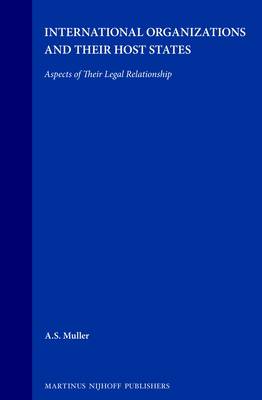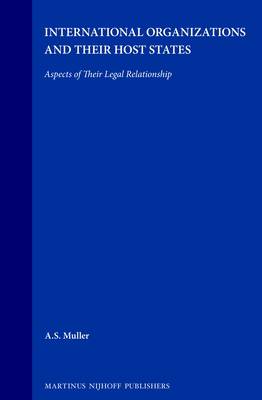
- Afhalen na 1 uur in een winkel met voorraad
- Gratis thuislevering in België vanaf € 30
- Ruim aanbod met 7 miljoen producten
- Afhalen na 1 uur in een winkel met voorraad
- Gratis thuislevering in België vanaf € 30
- Ruim aanbod met 7 miljoen producten
Zoeken
€ 439,95
+ 879 punten
Omschrijving
Since 1945 there has been a tremendous growth in the number of international organizations, leading to the development of a body of law regulating the relationship between the organizations and their host states. International Organizations and their Host States examines the relationship from a practical perspective.
Before examining the legal status, privileges and immunities that have commonly been granted to international organizations, the diverse sources where the law can be found are brought together in a new concept: the host arrangement. This concept forms an anchor for the examination of the following aspects of the legal relationship: the legal personality of the organization, the status of its seat, the inviolability of its premises, assets and archives, its jurisdictional immunity, its communications privileges, and its fiscal, customs and financial privileges. In conclusion, the legal concepts underlying the relationship between international organizations and their host states are analyzed and suggestions are made on improving the coherency of the law.
Before examining the legal status, privileges and immunities that have commonly been granted to international organizations, the diverse sources where the law can be found are brought together in a new concept: the host arrangement. This concept forms an anchor for the examination of the following aspects of the legal relationship: the legal personality of the organization, the status of its seat, the inviolability of its premises, assets and archives, its jurisdictional immunity, its communications privileges, and its fiscal, customs and financial privileges. In conclusion, the legal concepts underlying the relationship between international organizations and their host states are analyzed and suggestions are made on improving the coherency of the law.
Specificaties
Betrokkenen
- Auteur(s):
- Uitgeverij:
Inhoud
- Aantal bladzijden:
- 336
- Taal:
- Engels
- Reeks:
- Reeksnummer:
- nr. 21
Eigenschappen
- Productcode (EAN):
- 9789041100801
- Verschijningsdatum:
- 1/05/1995
- Uitvoering:
- Hardcover
- Formaat:
- Genaaid
- Afmetingen:
- 166 mm x 245 mm
- Gewicht:
- 739 g

Alleen bij Standaard Boekhandel
+ 879 punten op je klantenkaart van Standaard Boekhandel
Beoordelingen
We publiceren alleen reviews die voldoen aan de voorwaarden voor reviews. Bekijk onze voorwaarden voor reviews.








